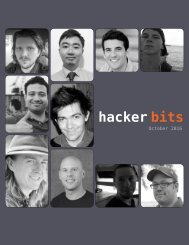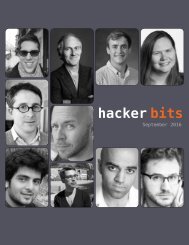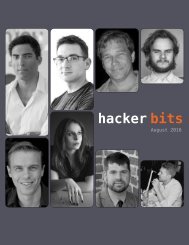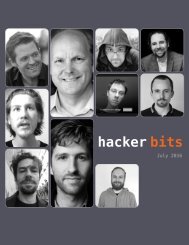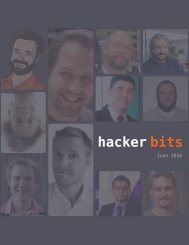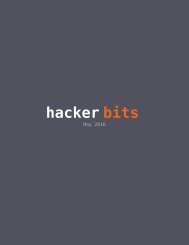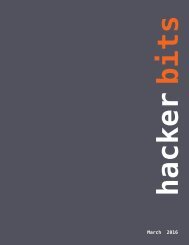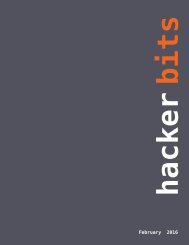Hacker Bits, April 2016
HACKER BITS is the monthly magazine that gives you the hottest technology and startup stories crowdsources by the readers of Hacker News. We select from the top voted stories for you and publish them in an easy-to-read magazine format. Get HACKER BITS delivered to your inbox every month! For more, visit http://hackerbits.com.
HACKER BITS is the monthly magazine that gives you the hottest technology and startup stories crowdsources by the readers of Hacker News. We select from the top voted stories for you and publish them in an easy-to-read magazine format.
Get HACKER BITS delivered to your inbox every month! For more, visit http://hackerbits.com.
Create successful ePaper yourself
Turn your PDF publications into a flip-book with our unique Google optimized e-Paper software.
ace to answer. Practice writing<br />
the answers on a whiteboard<br />
(not all companies require this,<br />
but it’s the worst case, so you<br />
should practice it). A pen on<br />
paper is a pretty good simulation<br />
of a whiteboard. If you have<br />
friends who can help you prepare,<br />
taking turns interviewing<br />
each other is great. Reading a<br />
lot of interview questions has<br />
the added benefit of providing<br />
you ideas to use when in actual<br />
interviews. A surprising number<br />
of questions are re-used (in full<br />
or in part).<br />
Even experienced (and<br />
stress-free) candidates will<br />
benefit from this. Interviewing<br />
is a fundamentally different skill<br />
from working as a programmer,<br />
and it can atrophy. But experienced<br />
programers often (reasonably)<br />
feel that they should not<br />
have to prepare for interviews.<br />
They study less. This is why<br />
junior candidates often actually<br />
do better on interview questions<br />
than experienced candidates.<br />
Companies know this, and,<br />
paradoxically, some tell us they<br />
set lower bars on the programming<br />
questions for experienced<br />
candidates.<br />
8. Mention credentials<br />
Credentials bias interviewers.<br />
Triplebyte candidates who have<br />
worked at a top company or<br />
studied at a top school go on to<br />
pass interviews at a 30% higher<br />
rate than programmers who<br />
don’t have these credentials (for<br />
a given level of performance on<br />
our credential-blind screen). I<br />
don’t like this. It’s not meritocratic<br />
and it sucks, but if you<br />
have these credentials, it’s in<br />
your interest to make sure that<br />
your interviewers know this. You<br />
can’t trust that they’ll read your<br />
resume.<br />
9. Line up offers<br />
If you’ve ever read fund-raising<br />
advice for founders, you’ll<br />
know that getting the 1st VC to<br />
make an investment offer is the<br />
hardest part. Once you have one<br />
offer, more come pouring in.<br />
The same is true of job offers.<br />
If you already have an offer, be<br />
sure to mention this in interviews.<br />
Mentioning other offers<br />
in an interview heavily biases the<br />
interviewer in your favor.<br />
This brings up the strategy<br />
of making a list of the companies<br />
you’re interested in, and<br />
setting up interviews in reverse<br />
order of interest. Doing well earlier<br />
in the process will increase<br />
your probability of getting an<br />
offer from your number one<br />
choice. You should do this.<br />
Conclusion<br />
Passing interviews is a skill.<br />
Being a great programmer<br />
helps, but it’s only part of the<br />
picture. Everyone fails some of<br />
their interviews, and preparing<br />
properly can help everyone pass<br />
more. Enthusiasm is paramount,<br />
and research helps with this. As<br />
many programmers fail for lacking<br />
enthusiasm as those who<br />
fail for technical reasons. Interviewers<br />
help candidates during<br />
interviews, and if you follow a<br />
good process and communicate<br />
clearly, they will help you. Practice<br />
always helps. Reading lots<br />
of interview questions and inuring<br />
yourself to interview stress<br />
will lead to more offers.<br />
This situation is not ideal.<br />
Preparing for interviews is<br />
work, and forcing programmers<br />
to learn skills other than<br />
building great software wastes<br />
everyone’s time. Companies<br />
should improve their interview<br />
processes to be less biased by<br />
academic CS, memorized facts,<br />
and rehearsed interview processes.<br />
This is what we’re doing<br />
at Triplebyte. We help programmers<br />
get jobs without looking<br />
at resumes. We let programmers<br />
pick one of several areas in<br />
which to be evaluated, and we<br />
study and improve our process<br />
over time. We’d love to help you<br />
get a job at a startup, without<br />
jumping through these hoops.<br />
You can get started here. But the<br />
status quo is what it is. Until this<br />
changes, programmers should<br />
know how to prepare. •<br />
Reprinted with permission of the original author. First appeared at blog.triplebyte.com.<br />
hacker bits<br />
17








